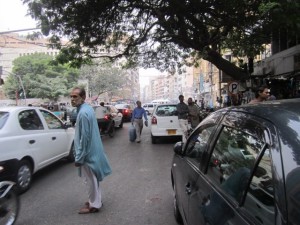WASHINGTON – For the first time in its history, Pakistan will hold general elections Saturday in which the country’s first popularly elected government will hand over power to another democratically elected government, despite a series of deadly attacks by the Taliban aimed at disrupting the elections.
The Obama administration wanted to “see credible, free and fair elections on a timely basis,” said U.S. Ambassador to Pakistan Richard Olson, but is playing no favorites among candidates from the ruling Pakistan People’s Party or its political foes.
Pakistan’s government, modeled after the democratic parliamentary system of the United Kingdom, includes a bicameral federal legislature, consisting of the Senate, and the National Assembly. Voting will take place in the four regional provinces: Punjab, Sindh, Baluchistan and Khyber Pakhtunkhwa.
In a video statement issued from the U.S. embassy in Islamabad on April 23, Olson praised the strides made by Pakistan’s government to ensure a fair election, saying that the “United States supports the strengthening of civil and democratic institutions through the election process.”
But Rep. Dana Rohrabacher, R-Calif., has questioned why the U.S. has a relationship with a country that protects terrorist insurgents.
“They [Pakistan] are terrorists’ friends,” Rohrabacher said to Secretary of State John Kerry during a House Foreign Affairs hearing in April. “Shame on us. Not you, Mr. Secretary, but shame on us.”
Kerry disagreed, saying cutting support to Pakistan would hurt the progress the country has made. Pakistan is facing an escalation of attacks because of the upcoming election. In some parts of Pakistan, local elections have been postponed. Several Pakistani candidates running for seats have been killed. In total, 90 people have been killed since April, preventing candidates from openly campaigning.
On Monday, a bomb killed 25 and injured 65 people attending a political rally in Peshawar, the capitol of Khyber Pakhtunkhwa. And Thursday, gunmen abducted the son of Pakistan’s ex-prime minister Yousuf Raza Gilani. His son, Ali Haider Gilani, a candidate for the Pakistan People’s Party, is running for a seat in the Punjab provincial assembly.
The Pakistan Taliban has claimed responsibility for the recent string of attacks, calling the elections “un-Islamic” and the democratic system a breach of Islamic teachings. The Taliban uses fear and intimidation tactics to control many parts of Pakistan, and has also directly threatened several coalitions, including the Pakistan People’s Party, the Muttahida Quami Movement and the Awami National Party. The militant group has vowed to carry out suicide attacks on polling day.
This comes on the heels of testimony provided by Assistant Secretaries of Defense Michael Sheehan and Derek Chollet, who said terrorist groups like al-Qaida and the Taliban are “significantly diminished” because of U.S. military involvement in Afghanistan and Pakistan.
To counter the potential attacks, the Pakistani military plans to station troops at polling stations across the country on Election Day to provide security. Army Chief Gen. Asfhaq Parvez Kayani said last week that soldiers will do everything they can to limit disruptions.
“I assure you, that we stand committed to wholeheartedly assist and support in the conduct of free, fair and peaceful elections to the best of our capabilities and remaining within the confines of the constitution,” Kayani said during a speech that was televised in Urdu on Geo News, a Pakistani news channel. “This indeed is a golden opportunity, which can usher in an era of true democratic values in the country.”

